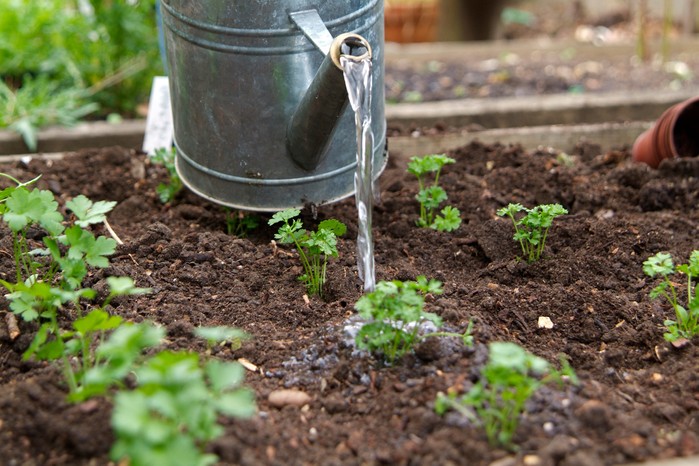
If you are just beginning a vegetable garden, it is essential to learn how to water them properly. The hotter the weather gets, the more your vegetables need water. They should be watered at least once per week, but it is best to water them twice or three times per week. Vegetables plants need different amounts of water, so it is important for them to be on a consistent schedule. This will make it easier to keep track of your plants and you.
Rain barrels are the best way to water your vegetable gardens. They can be buried next to your plants, and the water will soak into their roots. This is more efficient than using sprinklers. Sprinklers can be useful, but they can also be irritating. A rain gauge can help you determine the best time to water your garden. To see how much rain you have received in the last week, you can check the weather reports.

Depending on which type of vegetable your plant is, you might need to water it a couple times per day. This will prevent your veggies from becoming weedy, or even fungus-ridden. Your plants will grow deeper roots if they are given regular watering. Aside from that, the best time to water vegetable plants is at night when it is cooler. The evening hours are the best times to water your garden. It will also prevent you from wasting water.
You don't need water your vegetable gardens every day. It is only necessary to water your vegetable garden if it becomes thirsty. Most vegetable gardens don’t require watering. Vegetables such as eggplant, corn, cucumber and corn need plenty of water. Make sure to check the weather before planting a vegetable yard. This will ensure that you don’t miss any rain.
Mulch can be used to water vegetable gardens. Mulch helps to retain moisture in the soil and can even reduce the amount of water your plants need. When it is dry, the soil will dry out quickly and cause your plants to die. To stop the soil drying out, you can use straw. This will allow your plants to grow more efficiently. It is important to remember to mulch your vegetables. They will compete to water your vegetables and require lots of moisture. It is therefore important to remove these weeds.

You should also use drip irrigation. These irrigation systems provide water to the soil and do not damage the foliage. The hoses will be covered with mulch. Your vegetables require water at different stages of development. If you are just starting your vegetable garden, the moisture level is critical. It is crucial to have the right moisture levels for planting, flowering, fruiting and transplanting. Learn more in the article "Best Ways To Water Vegetable Gardening Under Dry Conditions".
FAQ
What should you do first when you start a garden?
The first thing you should do when starting a new garden is prepare the soil. This involves adding organic matter like composted manure and grass clippings as well as leaves, straw, straw, and other materials that provide nutrients to the soil. Next, you will plant your seeds or seedlings directly into the prepared holes. Finally, water thoroughly.
Can I grow vegetables indoors
Yes, it is possible for vegetables to be grown inside during winter months. You will need to get a grow light or greenhouse. You should check the laws in your area before you purchase a greenhouse.
What is a plant calendar?
A planting calendar is a list of plants that should be planted at different times throughout the year. The goal is to maximise growth while minimizing stress. The last frost date should be used to sow early spring crops, such as spinach, lettuce, and beans. Cucumbers, squash, and spring beans are later crops. The fall crops include potatoes and carrots.
What's the difference between aquaponic and hydroponic gardening?
Hydroponic gardening is a method that uses water to nourish plants instead of soil. Aquaponics uses fish tanks to grow plants. It's almost like having a farm right at home.
Does my backyard have enough room for a vegetable garden?
If you don't already have a vegetable garden, you might wonder whether you'll have enough room for one. The answer is yes. A vegetable garden doesn't take up much space at all. It just takes some planning. You could make raised beds that are only 6 inches tall. Or you can use containers to build raised beds. You'll still be able to get plenty of produce in any way.
Statistics
- According to the National Gardening Association, the average family with a garden spends $70 on their crops—but they grow an estimated $600 worth of veggies! - blog.nationwide.com
- Today, 80 percent of all corn grown in North America is from GMO seed that is planted and sprayed with Roundup. - parkseed.com
- According to a survey from the National Gardening Association, upward of 18 million novice gardeners have picked up a shovel since 2020. (wsj.com)
- As the price of fruit and vegetables is expected to rise by 8% after Brexit, the idea of growing your own is now better than ever. (countryliving.com)
External Links
How To
How do I keep weeds out of my vegetable garden?
Growing vegetables that are healthy is not possible due to weeds. They are a threat to water, nutrients and sunlight as well as for space. These are some tips to prevent them from taking control of your garden.
-
Dig up all plants when they flower
-
Be sure to remove any debris or leaves from the base.
-
Mulch is a good choice
-
Get enough water
-
Rotate crops
-
Don't let the grass grow too long
-
Keep soil moist
-
Plant early
-
Harvest often
-
Add compost
-
Avoid chemical pesticides
-
Organic vegetables are best
-
Buy heirloom seeds
-
Start small
-
Learn more about companion planting
-
Be patient
-
Enjoy gardening!